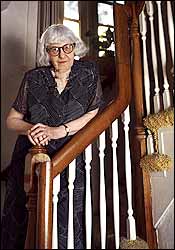
Cynthia ozick’s last novel, The Puttermesser Papers, created one of the most memorably comic protagonists of the nineties. Her hapless titular New Yorker was a careerist lawyer who fashioned a golem out of her houseplants. It was declared her best novel, and critics clamored for more. But Ozick kept them waiting seven years, while advancing a side gig in intellectual essay collections with binary, Sontagian titles like Fame & Folly and Quarrel & Quandary.
Ozick finally returns to novels with the historical gem Heir to the Glimmering World, and this time, her lost souls are a bit farther afield: a maltreated and resourceful nanny named Rose, a man traumatized by childhood fame, and the impoverished family of a bourgeois scholar exiled from Nazi Germany to the farthest corners of the rural Bronx. Their fates become entangled out of physical and emotional desperation.
It all seems a bit Dickensian—a catalogue of suffering, then finally just deserts for all, thanks to a financial deus ex machina. But despite the book’s antiquarian patina, nineteenth-century moralists were far from Ozick’s mind. “The kind of book I wanted to write was a reasonably sized, accessible literary novel in the tradition of E. M. Forster,” says the writer, whose favorite twentieth-century novel is A Passage to India. Accessibility is a word Ozick soon disavows—“it’s the way commerce would put it”—but it’s certainly on her mind.
“I want to be read,” Ozick insists, bristling, too, at the word erudite. “I’m not in the business of being a scholar.” Heir, while hardly the comic romp that her last novel was, is spare and lucid. “I never was so ambitious as I was in my first novel,” she says. “It’s not a diminution of ambition, nor is it a particular striving to reach the common reader. I think I’ve become simpler.”
And what of her nonfiction pensées? “In the hierarchy of the genres, I put fiction so far above essays. Let’s take Virginia Woolf,” says Ozick. “We are interested in her essays because we love the novels.”
Still, Ozick’s novels serve both as complement and contradiction to her commentary. Her essays are often baldly political, but she insists that “when a novel is really a great novel, it’s so tightly woven you can’t sort it out. I’ve tried to make the weave so tightly woven that it becomes invisible.”
Yet Ozick concedes that too much perfectionism too soon has hidden costs. After polishing her first novel, Trust, for years, Ozick finally published it at the age of 37. The youth of today, she warns, should not follow her example. “I think what people ought to do is go out into the world,” says Ozick, “and don’t put all your eggs in one huge basket as I did with my first novel, thinking it was going to be the great American novel. If you are late, later than the rest of your generation, you can never get over it. It leaves its mark forever, and I don’t think it’s ever made up for.”
Heir to the Glimmering World, Houghton Mifflin, September.
